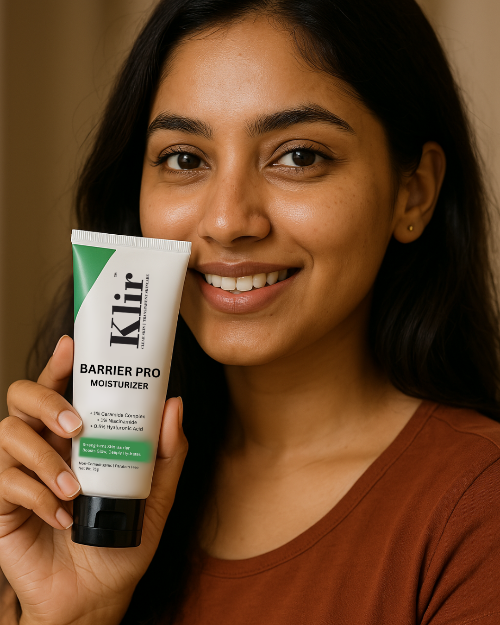
Signs Your Skin Barrier is Damaged (And How to Fix It)
Your skin barrier is your body’s first defense—protecting against pollution, bacteria, allergens, and water loss. When this barrier gets compromised, your skin becomes vulnerable, reactive, and inflamed. But the good news is: it’s fixable.
In this blog, we’ll help you identify barrier damage, explain why it happens, and guide you to restore skin health using scientifically backed herbal skincare.
🧪 What is the Skin Barrier?
The skin barrier is the outermost layer of your skin, often called the stratum corneum, made up of ceramides, fatty acids, and cholesterol. It keeps moisture in and irritants out.
When damaged, it leads to:
-
Water loss
-
Inflammation
-
Bacterial invasion
-
Sensitivity
-
Hyperpigmentation
🚩 Common Signs of a Damaged Skin Barrier
If you’ve experienced any of these lately, your skin barrier might be crying for help:
-
Persistent Dryness & Flaking
-
Stinging or Burning Sensation (especially after applying products)
-
Redness or Itchiness
-
Sudden Breakouts or Acne
-
Tightness After Washing
-
Hyperpigmentation or Dark Spots That Won’t Heal
-
Increased Sensitivity to Products
🛠️ What Damages the Skin Barrier?
-
Over-exfoliating with strong scrubs or acids
-
Using harsh cleansers or alcohol-based toners
-
Skipping sunscreen
-
Pollution and UV exposure
-
Lack of ceramides or skin-repairing nutrients in skincare
🌿 How to Repair It (Gently + Naturally)
1. ✅ Add a Barrier-Strengthening Moisturizer
Use: KLIR Barrier Pro Ceramide Moisturizer
Formulated with 5 essential ceramides, soothing centella extract, and cholesterol-lipid complex, this moisturizer mimics your skin’s natural barrier and seals in hydration.
💡 Why it works:
Ceramides restore the skin’s lipid matrix, helping it heal faster and become more resilient.
2. ✅ Include Vitamin C to Fade Pigmentation & Support Healing
Use: Neuhack Pigmed 20% Vitamin C Serum
This powerful antioxidant serum fights free radical damage caused by UV and pollution while helping even skin tone and promoting collagen production.
💡 Why it works:
Vitamin C not only fades pigmentation but also stimulates your skin’s own repair response and reduces inflammation.
3. 🧴 Simplify Your Routine
-
Avoid multiple actives until the skin calms
-
Use pH-balanced cleansers
-
Stick to hydrating + soothing ingredients
-
Apply sunscreen daily to prevent further barrier breakdown
🌞 Pro Tip: Don't Skip Sunscreen!
Even the best repair routine fails if you’re not protecting your skin during the day. Use a broad-spectrum SPF 50 sunscreen to keep UV and pollution from worsening barrier damage.
🔄 How Long Does It Take to Heal?
With a consistent barrier-repairing routine, most people see visible improvements in 2–4 weeks, including:
-
Less redness
-
Fewer breakouts
-
More balanced oil levels
-
Improved glow and texture
🧖♀️ Final Thoughts
Your skin barrier is the foundation of skin health. Ignoring its signals can lead to long-term issues—but restoring it doesn’t have to be complicated. With minimal, science-backed herbal products like KLIR’s ceramide moisturizer and vitamin C serum, you can rebuild your barrier and reclaim calm, radiant skin.